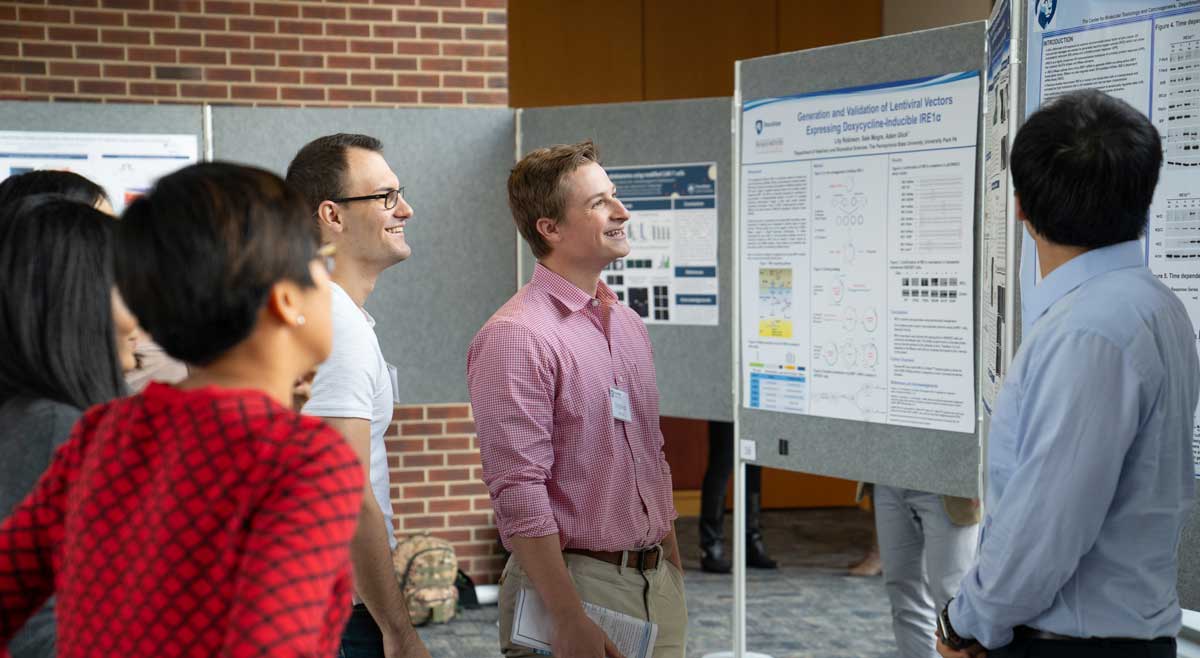Cancer Research Training and Education Coordination - Penn State Cancer Institute
Cancer Research Training and Education Coordination
Penn State Cancer Institute plays a vital role in training and educating the next generation of cancer research investigators, and in preparing trainees for sustaining careers in cancer research.
This includes all types of research from basic science research that provides enhanced understanding of the mechanisms of cancer in the body, to population science research that identifies cancer health disparities, to advances in clinical care for those diagnosed with cancer.
The Cancer Institute pipeline programs provide transdisciplinary cancer research training across all career levels, from pre-college through faculty.
Explore some of these developmental programs below.

For Pre-College Educators
In partnership with Penn State Center for Science and Schools, the Cancer Institute offers a seven-week summer Research Experience for STEM Teachers from secondary schools within the Cancer Institute Catchment area. This program features authentic research with a Cancer Institute member (located in either the Hershey or University Park campus of Penn State University) combined with teacher professional development activities to translate research experiences into innovative classroom projects.
The goal of the program is to make cancer research approachable for all STEM teachers, including biology, physics, chemistry, math, computer science, and illustrate the transdisciplinary nature of modern day cancer research.
For Undergraduate College Students
At the Hershey campus, the Summer Undergraduate Research Internship Program allows rising juniors and seniors interested in pursuing a career in the biological sciences to complete a mentored research project.
Programs at the University Park campus include a special research intensive for students in Penn State's Schreyer Honors College and an immersive undergraduate Millennium Scholars program for underserved minority students seeking STEM careers.
For Graduate Students and Postdoctoral Fellows
Penn State offers a number of doctoral degree programs in the biomedical sciences that include special training in cancer research.
The Molecular, Cellular and Integrative Biosciences PhD graduate program at the University Park campus offers an emphasis in cancer biology and an oncology bench-to-bedside course.
At the College of Medicine (Hershey campus), students can pursue a graduate degree through the Cancer Biology option of the Biomedical Sciences PhD program, or a professional degree in advanced public health education through the Doctor of Public Health (DrPH) program.
Additional, cancer-relevant Penn State doctoral training grants contribute to the overall excellence of graduate student training within the Cancer Institute, including the NIGMS/T32 Medical Scientist Training Program (the MD/PhD Medical Scientist Training Program) and the NIGMS/T32 Computational Bioinformatics program.
Select graduate students and postdoctoral scholars also have the opportunity to be part of the “Viruses and Cancer” T32 grant from the National Cancer Institute.
For Medical Students
All Penn State medical (MD program) students are required to perform a Medical Student Research Project. Many Cancer Institute faculty serve as mentors, and the Hill Family scholarship supports summer research of medical students performing cancer research.
Medical students also have a number of opportunities to explore careers in cancer research. For example, the Hematology/Oncology medical student interest group offers “Pioneer Lunches” with a chance to network with researchers as well as outside speakers to inspire students to pursue cancer research careers.
For Residents and Fellows
Medical school graduates can pursue a number of options in cancer-related residencies and fellowships at Penn State. A three-year hematology/oncology fellowship and a one-year hematopathology fellowship provide opportunities for care across the life cycle, and a three-year pediatric hematology/oncology fellowship provides a focused look at childhood cancers. A head and neck oncology fellowship and breast imaging fellowship provide opportunities to study specific cancer types.
Graduate medical trainees in a variety of areas can participate in the Physician-Scientist Training Program, which fosters interdisciplinary collaborations through a sustainable physician-scientist career development pipeline.
For Faculty
The Cancer Institute directly supports junior faculty development through the American Cancer Society Institutional Research Grant. These funds are intended to provide seed money to new investigators to help them with starting their research programs and to obtain preliminary data in support of more extensive research application which must have a clear and strong cancer focus. Applications must have a clear and strong cancer focus.
Additional faculty development opportunities are available across various career stages. The four-week K Grant Workshop for early career investigators is offered each spring and provides participants the tools needed to craft a competitive mentored career development proposal. The Junior Faculty Development Program combines a comprehensive curriculum of weekly lessons with an individual project completed under the guidance of a senior faculty mentor. The Grants Academy is a structured workshop to assist participants with preparation and submission of an independent investigator-initiated grant application.
For Health Care Providers in the Community
The Cancer Institute sponsors several accredited continuing education programs for health care professional development. These include the annual symposium, a program on thyroid cancer, a review course for clinical oncologists and a program on gastrointestinal oncology.
There is also an annual public forum called Reducing Cancer in Our Community, an annual melanoma mini-symposium, and a Pediatric Research Day event.
A number of speaker series, lectures and interdisciplinary conference promote research within the Cancer Institute's three research programs and with other clinicians at Penn State Health's various locations.
